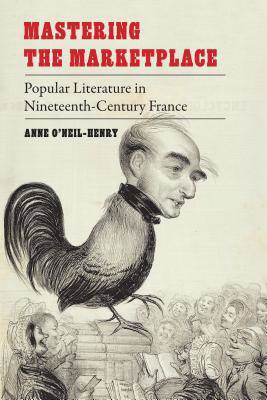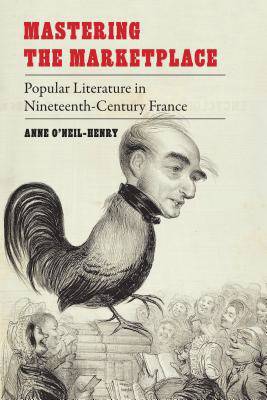
Door een staking bij bpost kan je online bestelling op dit moment iets langer onderweg zijn dan voorzien. Dringend iets nodig? Onze winkels ontvangen jou met open armen!
- Afhalen na 1 uur in een winkel met voorraad
- Gratis thuislevering in België vanaf € 30
- Ruim aanbod met 7 miljoen producten
Door een staking bij bpost kan je online bestelling op dit moment iets langer onderweg zijn dan voorzien. Dringend iets nodig? Onze winkels ontvangen jou met open armen!
- Afhalen na 1 uur in een winkel met voorraad
- Gratis thuislevering in België vanaf € 30
- Ruim aanbod met 7 miljoen producten
Zoeken
Mastering the Marketplace
Popular Literature in Nineteenth-Century France
Anne O'Neil-Henry
Hardcover | Engels
€ 54,45
+ 108 punten
Omschrijving
Mastering the Marketplace examines the origins of modern mass-media culture through developments in the new literary marketplace of nineteenth-century France and how literature itself reveals the broader social and material conditions in which it is produced. Anne O'Neil-Henry examines how French authors of the nineteenth century navigated the growing publishing and marketing industry, as well as the dramatic rise in literacy rates, libraries, reading rooms, literary journals, political newspapers, and the advent of the serial novel. O'Neil-Henry places the work of canonical author Honoré de Balzac alongside then-popular writers such as Paul de Kock and Eugène Sue, acknowledging the importance of "low" authors in the wider literary tradition. By reading literary texts alongside associated advertisements, book reviews, publication histories, sales tactics, and promotional tools, O'Neil-Henry presents a nuanced picture of the relationship between "high" and "low" literature, one in which critics and authors alike grappled with the common problem of commercial versus cultural capital. Through new literary readings and original archival research from holdings in the United States and France, O'Neil-Henry revises existing understandings of a crucial moment in the development of industrialized culture. In the process, she discloses links between this formative period and our own, in which mobile electronic devices, internet-based bookstores, and massive publishing conglomerates alter--once again--the way literature is written, sold, and read.
Specificaties
Betrokkenen
- Auteur(s):
- Uitgeverij:
Inhoud
- Aantal bladzijden:
- 258
- Taal:
- Engels
Eigenschappen
- Productcode (EAN):
- 9781496201980
- Verschijningsdatum:
- 1/12/2017
- Uitvoering:
- Hardcover
- Formaat:
- Genaaid
- Afmetingen:
- 152 mm x 229 mm
- Gewicht:
- 548 g

Alleen bij Standaard Boekhandel
+ 108 punten op je klantenkaart van Standaard Boekhandel
Beoordelingen
We publiceren alleen reviews die voldoen aan de voorwaarden voor reviews. Bekijk onze voorwaarden voor reviews.











